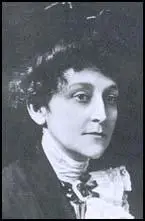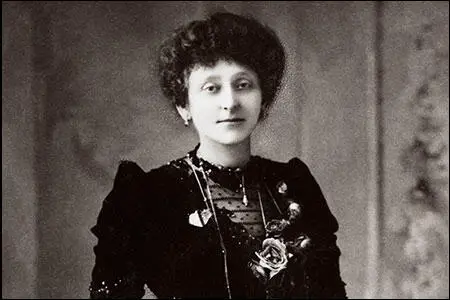Maud Arncliffe Sennett

Maud Sparagnapane, the elder daughter of Gaudente Sparagnapane, an Italian immigrant wholesale confectioner, and his wife, Aurelia Williams, was born on 4th February 1862. According to Elizabeth Crawford: "Nothing is known of her education. Of striking, dark appearance, she became an actress, using the stage name Mary Kingsley. She played at theatres throughout England and Scotland and, for a year, in Australia."
On 9th July 1898 she married Henry Robert Arncliffe Sennett, who took over the family business in Clerkenwell, Gaudente Sparagnapane and Company, that boasted that it was the country's "Oldest Established Manufacturers of Christmas Crackers and Wedding Cake Ornaments".
In January 1906 Maud Arncliffe Sennett read a letter from Millicent Fawcett about women's suffrage in The Times. As a result she joined the London Society for Women's Suffrage. Soon after she became a member of the Hampstead branch of the Women Social & Political Union (WSPU). According to her biographer "her experience as an actress made her a most effective speaker".
In June 1908 Sennett resigned from the WSPU. She now joined the Women's Freedom League and later became a member of its national executive. In her autobiography she commented on the WFL's two leaders, Teresa Billington-Greig and Charlotte Despard: "Billington-Greig was brilliant, but, I think, weak secretary who held the fort for the absent leader and kept grip of the machine. Mrs Despard, the popular reformer, did not organise; she was president and a sort of flaming torch that toured London and the country." Maud Arncliffe Sennett resigned from the WFL in July 1910.
Sennett was also active in the the Actresses' Franchise League. In her autobiography she claims that "there was more peace and harmony among these gracious women, and more generosity of mind and less jealousy than one had seen in the other groups." She also gave donations to the Men's League For Women's Suffrage.
In November 1911 she was arrested for breaking a window in the office of The Daily Mail. In court she explained it was a protest against the paper's policy of ignoring the fund-raising success of the WSPU. She added: "I broke the windows of the Daily Mail as a protest against the corruption of the Press for withholding, with malice aforethought, the truth about the suffrage movement from the great British public. I am an employee of male labour, and the men who earn their living through the power of my poor brain, the men whose children I pay to educate, whose members of Parliament I pay for, and to whose old-age pensions I contribute - these are allowed a vote, while I am voteless." Her subsequent fine was paid by Lord Northcliffe, the owner of the newspaper.
Despite no longer being a member, Maud Arncliffe Sennett, continued to give money to the Women Social & Political Union until it started its arson campaign. In June 1913 she also gave £100 to The Daily Herald. Later that month she resigned from the Actresses' Franchise League. In 1914 she joined the United Suffragists.
On 4th August, 1914, England declared war on Germany. Two days later the NUWSS announced that it was suspending all political activity until the war was over. The leadership of the WSPU began negotiating with the British government. On the 10th August the government announced it was releasing all suffragettes from prison. In return, the WSPU agreed to end their militant activities and help the war effort.
Annie Kenney reported that orders came from Christabel Pankhurst: "The Militants, when the prisoners are released, will fight for their country as they have fought for the Vote." Kenney later wrote: "Mrs. Pankhurst, who was in Paris with Christabel, returned and started a recruiting campaign among the men in the country. This autocratic move was not understood or appreciated by many of our members. They were quite prepared to receive instructions about the Vote, but they were not going to be told what they were to do in a world war."

After receiving a £2,000 grant from the government, the WSPU organised a demonstration in London. Members carried banners with slogans such as "We Demand the Right to Serve", "For Men Must Fight and Women Must work" and "Let None Be Kaiser's Cat's Paws". At the meeting, attended by 30,000 people, Emmeline Pankhurst called on trade unions to let women work in those industries traditionally dominated by men.
Maud Arncliffe Sennett disagreed with this strategy and continued to campaign for women's suffrage, through the Women's Freedom League and the United Suffragists. She also provided financial support to Sylvia Pankhurst and the East London Federation of Suffragettes.
On 28th March, 1917, the House of Commons voted 341 to 62 that women over the age of 30 who were householders, the wives of householders, occupiers of property with an annual rent of £5 or graduates of British universities. After the passing of the Qualification of Women Act the first opportunity for women to vote was in the General Election in December, 1918.
Maud Arncliffe Sennett died from tuberculosis on 15th September 1936 at her home, Eversheds, Midhurst. Her husband then arranged the publication of her autobiography and gave to the British Museum the scrapbooks she had compiled during the suffrage campaign.

